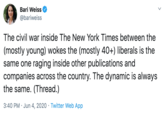Bari Weiss
Confirmed 17,210
| Navigation |
| About • History • Online Presence • Search Interest • External References • Recent Images |
About
Bari Weiss is an opinion writer and editor best known for her work with The Wall Street Journal and The New York Times. She has been described as conservative and a "left-leaning centrist." Online, she has become a divisive figure over writing several controversial pieces and for publicly condemning a lack of ideological diversity in media institutions. Weiss has drawn criticism from various controversial statements related to Israel, the #MeToo movement and the Brett Kavanaugh Supreme Court nomination. Conversely, Weiss has been praised by some conservatives and liberals for providing points of view that run counter to popular ways of thinking about modern issues. In 2018, Weiss published an article which helped popularize the phrase Intellectual Dark Web, originally coined by mathematician Eric Weinstein.
History
Bari Weiss was born March 24th, 1986 in Pittsburgh, Pennsylvania.[1] She went to school at Columbia University in New York City, where she claims she had "a front-row seat to leftist anti-Semitism" in Universities. She founded the Columbians for Academic Freedom organization, which she said was to combat professors "intimidating" students who expressed pro-Israel sentiments. She was part of a campaign to get Columbia to investigate professors who expressed pro-Palestine sentiments and allegedly intimidated pro-Israel students. A committee formed by the university found one instance that could be construed as intimidating behavior but "no evidence of any statements made by the faculty that could reasonably be construed as anti-Semitic."[2]
She began her writing career at Haaretz and The Forward, where she argued against Barnard College granting tenure to anthropologist Nadia Abu El-Haj over her book examining Israeli ideology.[3]
She began writing at The Wall Street Journal in 2013.[4] There she wrote pieces lamenting the "PC Police"[5] and leftism at college campuses.[6] She joined the New York Times in 2017,[7] where she wrote several controversial pieces. She argued the 2017 Women's March protesting Donald Trump "embraced decidedly illiberal causes and cultivated a radical tenor that seems determined to alienate all but the most woke." On MSNBC, she wondered if the sexual assault charges against Brett Kavanaugh should disqualify him from a piece on the Supreme Court.[1] She also criticized the #MeToo movement[8] for being too strident when Aziz Ansari was alleged to have committed sexual misconduct.
In May of 2018, she wrote about the "Intellectual Dark Web" in the New York Times,[9] profiling Sam Harris, Eric Weinstein, Bret Weinstein, Dave Rubin, Joe Rogan, Jordan Peterson, Ben Shapiro, Christina Hoff Sommers and Claire Lehmann.
She was criticized throughout her tenure at the New York Times for her opinion pieces by readers and Times staff.[10] Tensions heightened following the Tom Cotton Op-ed Controversy, in which New York Times staff publically and privately criticized the Op-ed page's decision to publish a piece by Republican Senator Tom Cotton arguing for the use of military intervention to quell the George Floyd Protests. The backlash led to the resignation of the Opinion page's editor James Bennet. Weiss[11] tweeted that the resignation was a result of a "civil war inside The New York Times between the (mostly young) wokes the (mostly 40+) liberals."

Weiss co-signed Harper's A Letter On Justice And Open Debate.
Resignation From The New York Times
On July 14th, 2020, Weiss resigned from the opinion page of the New York Times.[10][12] She cited an "illiberal" work environment and "bullying" from her co-workers as reasons for the decision, noting co-workers called for her firing on Slack. She claimed "intellectual curiosity" is "now a liability at The Times." She wrote, "Twitter is not on the masthead of The New York Times. But Twitter has become its ultimate editor." Acting editorial page editor Kathleen Kingsbury stated, "We appreciate the many contributions that Bari made to Times Opinion. I’m personally committed to ensuring that The Times continues to publish voices, experiences and viewpoints from across the political spectrum in the Opinion report."[10]
Her resignation caused her name to trend on Twitter throughout the day. Some Twitter users described the resignation as exemplary of the myths of cancel culture. User @CenkUygur[13] tweeted, "Resignation of @bariweiss is peak right-wing: 1.Start cancel culture by trying to get Arab & Muslim professors fired. 2.Quit while pretending to be canceled so you can claim victimhood. 3.Claim to be free speech martyr while crying about others criticizing you with their speech." High-profile conservative users, including Donald Trump Jr., promoted the resignation as an example of the illiberal left.


Online Presence
Weiss is most active on Twitter, where she has over 214,000 followers.[15]
Search Interest
External References
[1] Vanity Fair – MAD ABOUT BARI WEISS THE NEW YORK TIMES PROVOCATEUR THE LEFT LOVES TO HATE
[2] New York Times – Columbia Panel Clears Professors Of Anti-Semitism
[3] The New Yorker – The Petition
[4] Wall Street Journal – Bari Weiss
[5] Wall Street Journal – The PC Police Outlaw Make-Believe
[6] Wall Street Journal – Jonathan Haidt on the Cultural Roots of Campus Rage
[7] New York Times – By Bari Wess
[8] New York Times – Aziz Ansari Is Guilty. Of Not Being a Mind Reader.
[9] New York Times – Meet the Renegades of the Intellectual Dark Web
[10] New York Times – Bari Weiss Resigns From New York Times Opinion Post
[11] Twitter – Bari Weiss
[14] Twitter – Donald Trump Jr
[15] Twitter – @BariWeiss
Recent Videos
There are no videos currently available.




Comments ( 19 )
Sorry, but you must activate your account to post a comment.
Please check your email for your activation code.